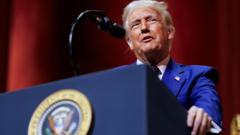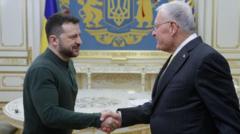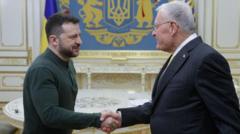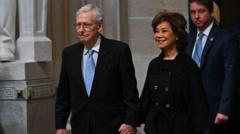The conflict between President Trump and President Zelensky intensifies following Trump's claims about Ukraine's role in the war with Russia, amid ongoing peace discussions that exclude Ukrainian involvement, unsettling EU leaders.
Tensions Escalate Between Trump and Zelensky Amidst Peace Talks

Tensions Escalate Between Trump and Zelensky Amidst Peace Talks
President Trump's controversial remarks spark a feud with Ukrainian President Zelensky, raising concerns over U.S.-Ukraine relations.
In a recent exchange, President Trump accused Ukrainian President Volodymyr Zelensky of acting like a "dictator" and alleged that Ukraine had initiated the war with Russia. Trump's comments were made in a social media post on Truth Social, and notably, he failed to reference Russian President Vladimir Putin or the earlier annexation of Ukrainian territory by Russia in 2014. The remarks have ignited tensions between both leaders, particularly as Trump implied that the responsibility for Ukraine's future security may not lie with the United States, stating, “This War is far more important to Europe than it is to us,” referencing America's geographic separation.
The feud began against the backdrop of peace negotiations in Saudi Arabia, where U.S. and Kremlin officials held discussions without Ukrainian representation. Following these talks, Zelensky strongly criticized Trump, claiming he had fallen prey to "disinformation." The Ukrainian president’s response highlighted a growing disillusionment among Ukrainians regarding the Trump administration's approach to the war.
European leaders convened for an emergency meeting to recalibrate their diplomatic strategies with the U.S., reflecting concerns over Trump's warming relations with Russia. Meanwhile, Russian officials expressed optimism for a reset in Moscow-Washington relations, signaling a shift that could further complicate Ukraine's position in this geopolitical landscape.
Trump's allegations against Ukraine, which have been widely criticized, are part of a series of controversial statements concerning U.S. foreign policy and strategy. As this situation develops, multiple angles—political, cultural, and social—represent the urgent need for clarity and coherence in U.S. foreign policy towards Europe and Ukraine.
The tensions are further complicated by concurrent domestic issues, including major staffing cuts within the Internal Revenue Service and Trump's direct criticism over delays in the modernization of Air Force One. These events hint at a turbulent atmosphere not only in international relations but also within the administration's domestic priorities.
The feud began against the backdrop of peace negotiations in Saudi Arabia, where U.S. and Kremlin officials held discussions without Ukrainian representation. Following these talks, Zelensky strongly criticized Trump, claiming he had fallen prey to "disinformation." The Ukrainian president’s response highlighted a growing disillusionment among Ukrainians regarding the Trump administration's approach to the war.
European leaders convened for an emergency meeting to recalibrate their diplomatic strategies with the U.S., reflecting concerns over Trump's warming relations with Russia. Meanwhile, Russian officials expressed optimism for a reset in Moscow-Washington relations, signaling a shift that could further complicate Ukraine's position in this geopolitical landscape.
Trump's allegations against Ukraine, which have been widely criticized, are part of a series of controversial statements concerning U.S. foreign policy and strategy. As this situation develops, multiple angles—political, cultural, and social—represent the urgent need for clarity and coherence in U.S. foreign policy towards Europe and Ukraine.
The tensions are further complicated by concurrent domestic issues, including major staffing cuts within the Internal Revenue Service and Trump's direct criticism over delays in the modernization of Air Force One. These events hint at a turbulent atmosphere not only in international relations but also within the administration's domestic priorities.



















